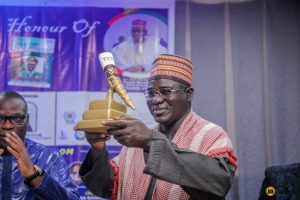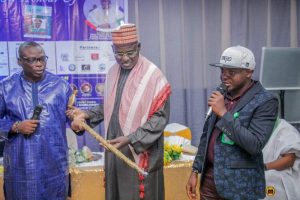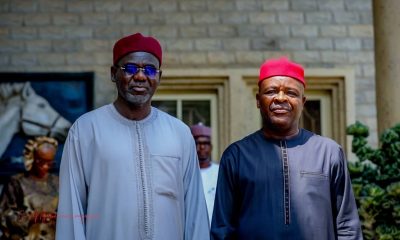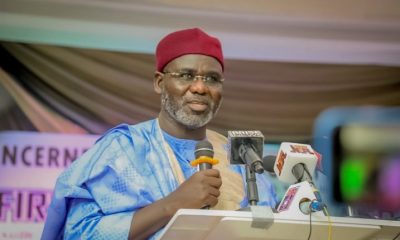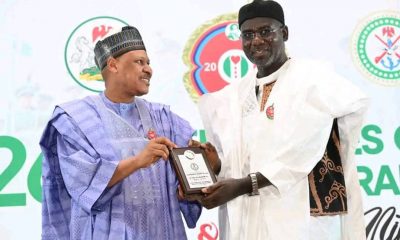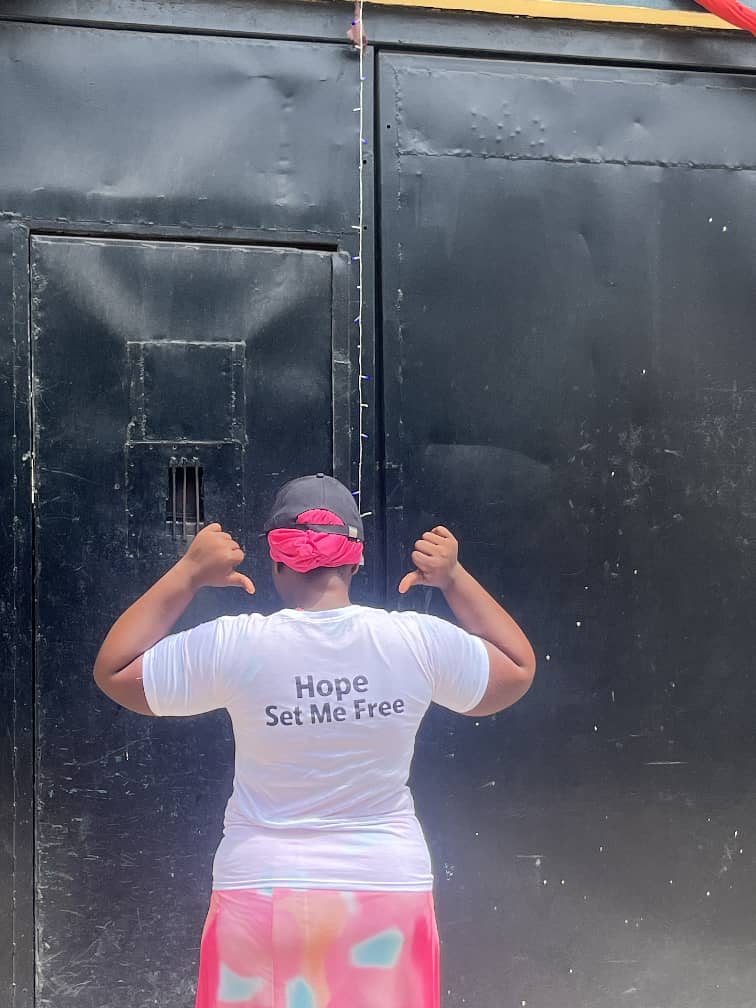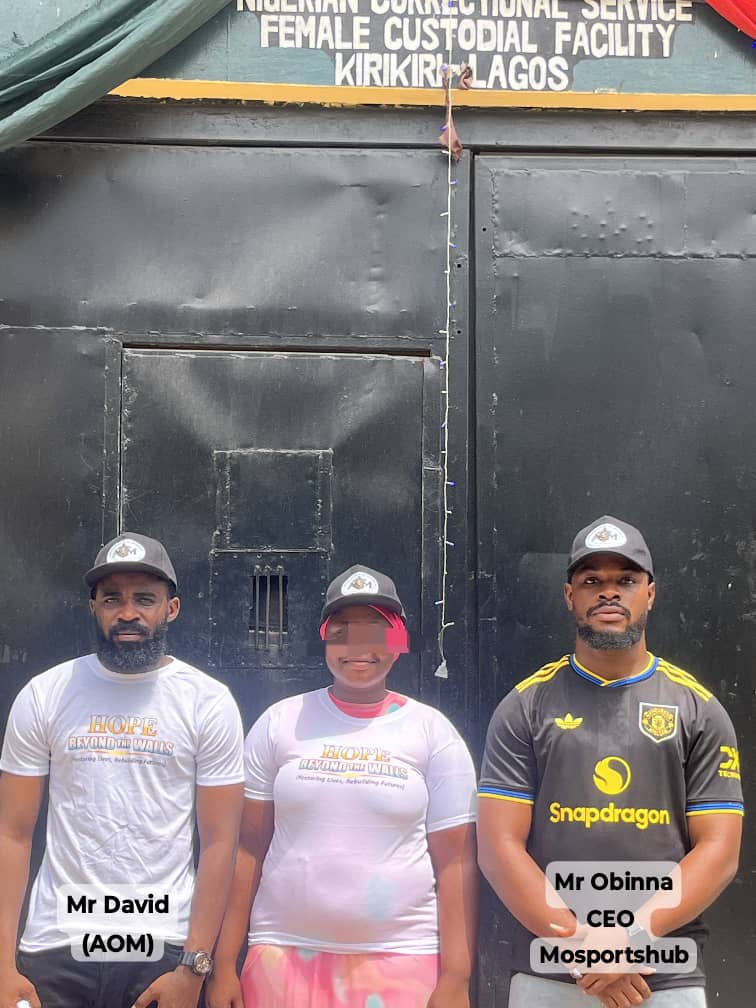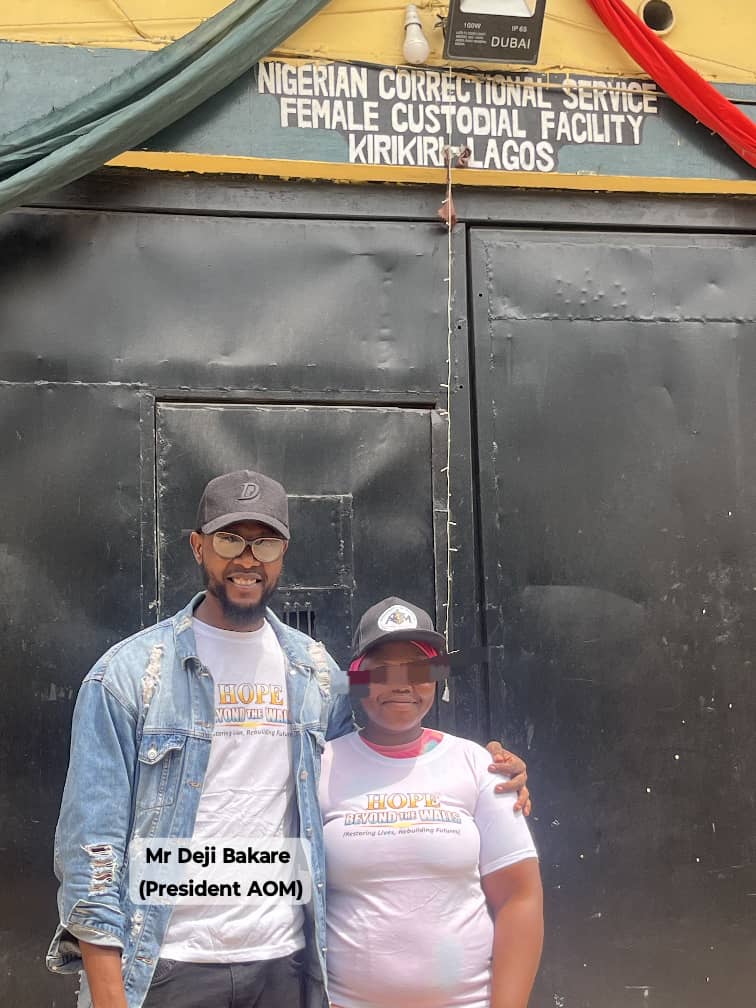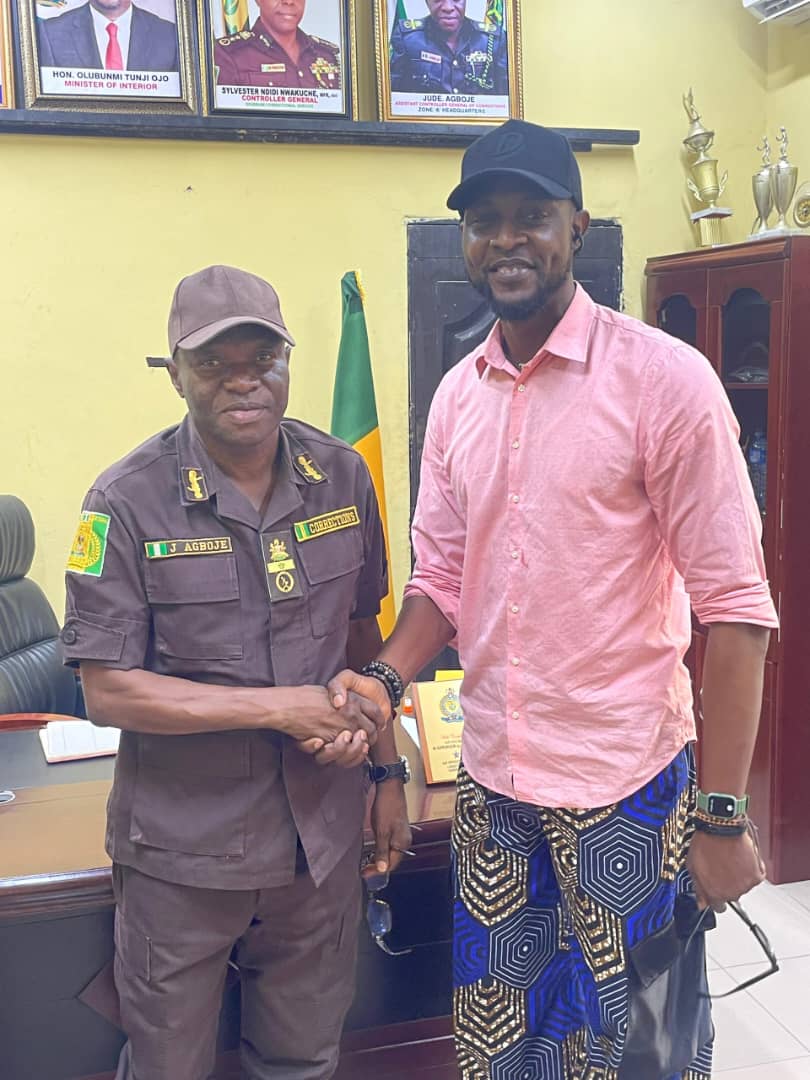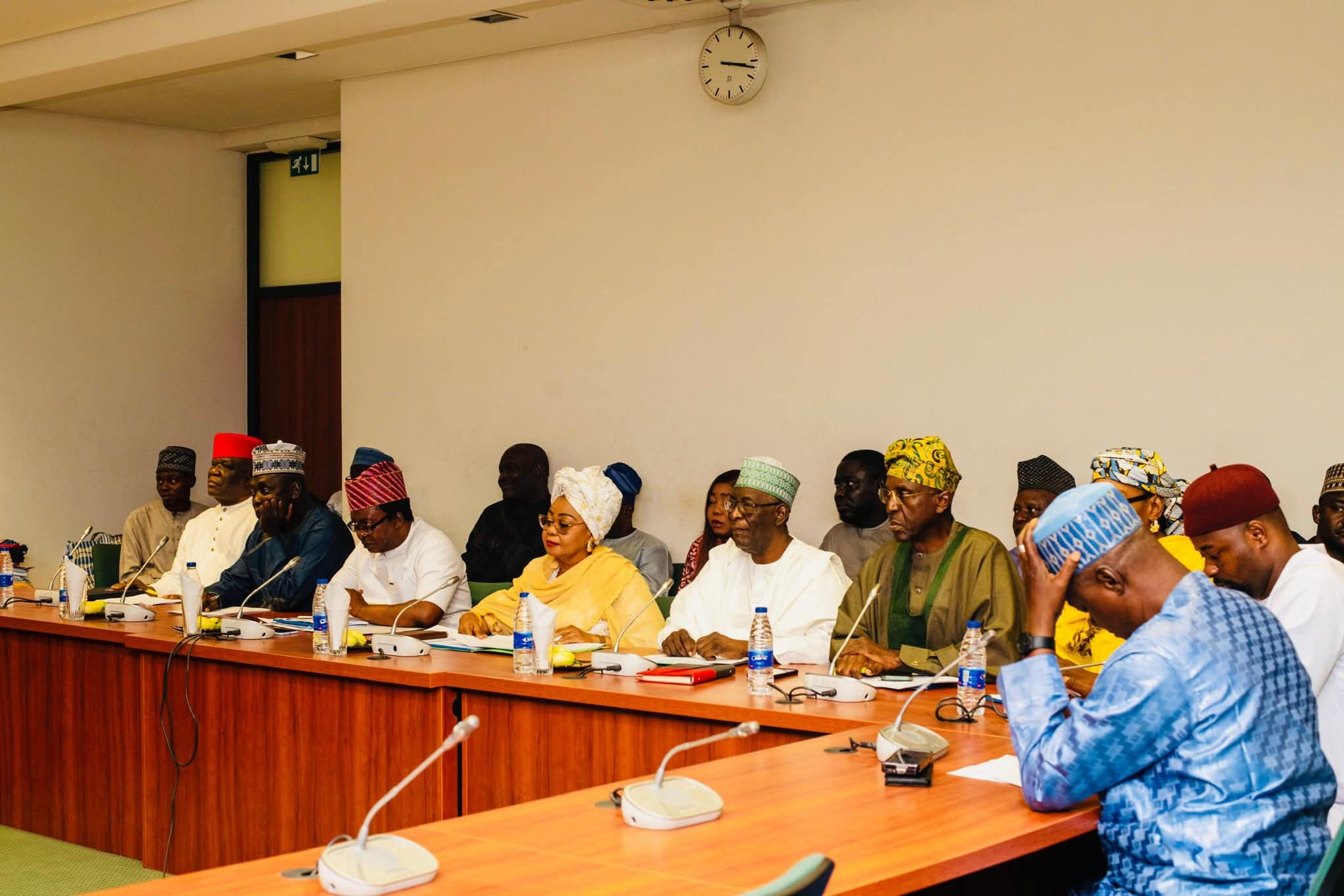society
Ambassador Buratai, A Certified Peace Expert, Offers Anecdotes To End Global Crises {Full Speech}
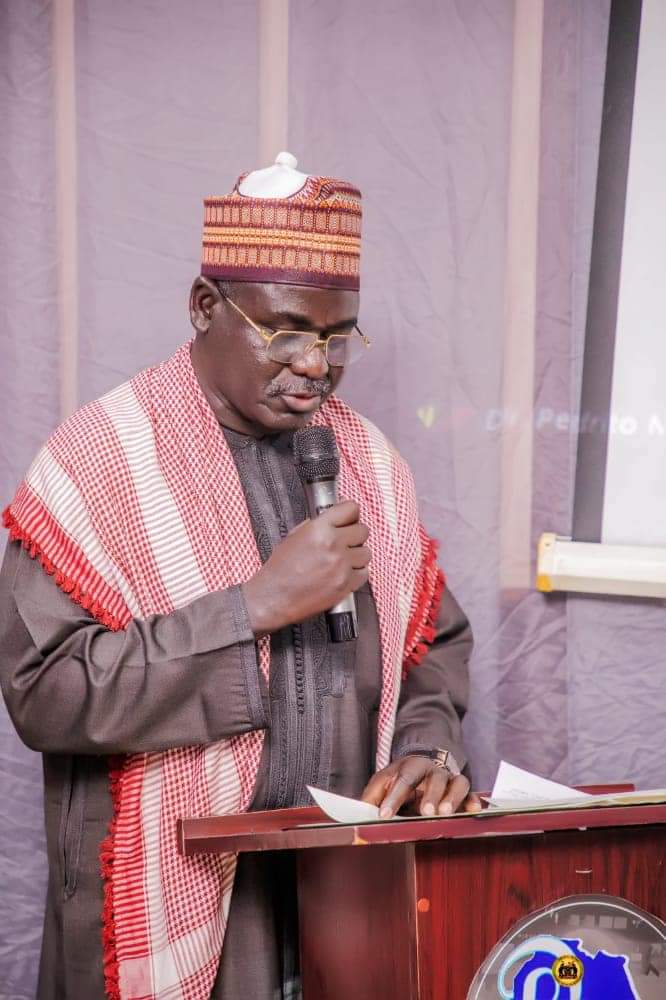
Ambassador Buratai, A Certified Peace Expert, Offers Anecdotes To End Global Crises {Full Speech}
By Olorunfemi Adejuyigbe
Decades of incongruous beliefs amongst humanity have birthed different shades of subversive and counter militant forces across the globe. In some important respects, these anti human forces have formed lives of their own.
According to the Council on Foreign Relations’s Global Conflict Tracker, the world was groping with at Least 27 Live Conflicts as of the last count, precisely in April, 2022.
In each case, nuclear arsenals are swelling. Millions are displaced. International law is disregarded with impunity, as criminal and terrorist networks profit from the division and violence.
In Nigeria, for instance, a terrorist group, Boko Haram, spearheaded by Mohammed Yusuf began the group in the year 2002, with a view of opposing western education with his followers. Though Yusuf is dead, Boko Haram, one of the largest Islamist militant groups in Africa has, since 2011, conducted terrorist attacks on religious and political groups, local police, and the military, as well as indiscriminately attacking civilians in busy markets and villages.
In the process, when things appeared to be getting out of control, a Kanuri born Army General, Tukur Yusuf Buratai, with shy mien, mounted the Nigeria’s defence soap box as Chief of Army Staff in 2015 with unmistakable message to the terrorists to quit or get destroyed.
Within a short period, Buratai reclaimed all the territories hitherto occupied by the insurgents. Peace unfolded and investors’ confidence restored.
However, it is not yet Uhuru. Security challenges across the world are unprecedented. Fierce armed gangs of sundry identities have besieged the world from nearly every corner The Nigerian state has a fair share of this tottering institutional embrace of the dark hour.
Against this back drop, the former Army boss now Nigerian Ambassador to the Republic of Benin, last week, offered anecdotes on how to achieve peace.
His speech, which he personally delivered at a World Peace Symposium in Lagos, where he was honoured as the first title holder of Bearer of Security Torch, is reproduced below:
I want to sincerely appreciate the World Institute for Peace and the organizers of this symposium for identifying me to be its torch bearer. It is humbling on one hand, and gratifying on the other; truly it is an evidence that the efforts of our dear nation and it’s various actors to achieve peace in these tumultuous times have not gone unnoticed, and are appreciated by your esteemed organization. Particularly, being the past Chief of the Army Staff, Nigerian Army which has been at the vanguard of almost all physical efforts at ensuring peace, I am grateful to the institute for this recognition, it is by extension a recognition of the role of the officers and soldiers of our esteemed military in the development of our nation.
From the day the Institute contacted me, I have gone through a moment of reflection on my early days as a young military officer up until my time at the helm of the Army, this has led to several mixed emotions. On one hand, I feel nostalgic for the moments in our history uncharacterized by terrorism and insecurity; on the other, sadness for the victims of insecurity, comrades in arms lost in the battle against insecurity, and their dependents left bereft of their loved ones. However, I am not deterred as I believe peace will be achieved, and we will keep striving. We must always strive to contribute to peace in our societies in whatever capacity we find ourselves. You must contribute either as a medical doctor, a nurse, an engineer, a trader, a barber, a farmer, or a labourer etc.
Following the evergreen words of Robert McNamara which says; “Development means security and without security, there is no development”. This, means that peace is at the heart of national development and advancement, thus highlighting the importance of the core values of the World Institute for Peace and by extension, the relevance of this symposium. The efforts of this organization, and all other organizations that promote peace, are germane to global peace and security.
Peace is not a notion that can be defined in a single sentence. It signifies many things to different people and may be perceived through different lenses; yet, there is a common acceptance that peace denotes the absence of violent conflict. In my years of service as a military officer up until my position as the Chief of Army staff, I have had the privilege of being an genuine participant in the quest for peace in Africa and Nigeria- from insurgency, terrorism, farmer-herder clashes, militancy, riots, Angola civil war, and the Bakasi War… to mention but a few. The Nigerian constitution recognises the Police Force as the primary institution tasked with the responsibility of handling internal security.
However, the rise of Boko Haram in 2009 signaled a shift in the nature of internal strife in Nigeria, necessitating a shift in strategy. As a result, the military, particularly the Army, was thrown into the spotlight, and this has progressively become the norm, with the military increasingly playing a role in internal security management. My contributions to the peace initiative stand as proof on their own, as an officer and in the many roles I performed in the Army. As a young Captain I was opportuned to participate in UN Peacekeeping/Observer Mission under the auspices of the United Nations Angola Verification Mission II (UNAVEM II) from 1993 – 1994. It was my first contribution to the global UN Peace initiative. As the commander of the newly reconstituted MNJTF, I worked hard to strategise and planned the fight against the Boko Haram Terrorists group that almost engulfed the Lake Chad Basin countries. The roles played by Nigeria, AU and Lake Chad Basin Commission (LCBC) were so strategic in bringing about the relative peace being enjoyed now. But during my tenure as Chief of Army Staff, one of my main objectives was to strengthen the interplay between the government’s kinetic and non-kinetic strategies in bringing about security and peace for our nation Nigeria.
The past years have also illuminated the importance of diplomacy, discourse, and the role of the community in achieving security. Religious leaders, traditional leaders, security personnel, political leaders, and the general citizenry have a part to play in achieving security in Nigeria and by extension the world.
I have also encountered another variable that is equally as important as the others highlighted above: ‘ Justice”. Justice according to the Merriam-Webster dictionary is the establishment or determination of rights according to the rules of law or equity. It is the conformity and the administration of what is right based on the law.
I believe that we can go a step further as a society. Our approach to handling these issues needs to be improved. Leaving it firmly in the hands of security agents is not completely working, we need to apply a structural functionalist approach to insecurity in Nigeria. All of us need to identify our parts in ensuring peace. Divisive elements have to be struck out, it is us against insecurity, therefore insecurity is the enemy. It is not a matter of Hausa, Igbo, or Yoruba. It is not a matter of Christian or Muslim, it is Nigeria against insecurity. Therefore, we have to be tolerant and alert. Irregularities in our neighborhoods have to be reported. The religious and traditional leaders have to preach tolerance and respect for others, and the political leaders need to make informed decisions. In this way, we can push down insecurity and achieve actual justice and eventual peace for our fallen heroes, brothers, sisters, fathers, uncles and husbands.
Following my exit from active service, I am fortunate, the leadership of His Excellency, President Muhammadu Buhari was gracious to appoint me as an Ambassador to positively portray the country’s image globally. This task I have set to carry it out judiciously since my appointment. I thank President Muhammad Buhari for giving me the privilege to serve as an ambassador of the Federal Republic of Nigeria.
Now a look at the global peace and security situations. According to UNICEF, from Ukraine to Yemen, conflict is taking a devastating toll. Nuclear arsenals are swelling. Conflict is on the rise. Millions are displaced. International law is disregarded with impunity, as criminal and terrorist networks profit from the division and violence. This is the situation the world finds itself in today.
10. The reasons for the outbreak of conflicts range from territorial disputes and regional tensions, to corruption and dwindling resources due to climate change. Conflicts disrupt access to basic services like food and water, and force people into extreme poverty, with the poorest and the most vulnerable paying the highest price. In addition to taking lives and devastating infrastructure in the short term, conflict and its consequences are profound and enduring, reversing progress towards achieving the Global Goals.
The current humanitarian crisis in Ukraine may be in the spotlight right now, but there are many conflicts occurring globally that deserve equal support and compassion. According to the Council on Foreign Relations’s Global Conflict Tracker, there are currently 27 ongoing conflicts worldwide. The tracker categorizes conflict into three groups: “worsening,” “unchanging,” and “improving.” Right now, there’s not a single conflict described as “improving.” Of those worsening are the conflict in Ukraine, the war in Afghanistan, political instability in Lebanon, the war in Yemen, the Rohingya crisis in Myanmar, and the conflict in Ethiopia. Other conflict areas and their impact include Sudan—Political tensions amid regional drought and conflict. Syria—Economic crisis compounds a decade of war. Somalia—Humanitarian access worsens as needs rise. Myanmar—Violent deadlock leaves millions in need. Democratic Republic of Congo—Conflict and disease compound crisis. South Sudan—Regional tensions raise risks. Nigeria—Growing insecurity across the country. Yemen—Cumulative impact of protracted conflict.
The UN has warned that peace is more under threat around the world than it has been since World War II. A quarter of the entire global population lives in conflict-affected areas. Some of the worst affected places are Ethiopia’s Tigray region, South Sudan, Syria, Yemen, and Afghanistan. According to the UN, last year, 84 million people were forcibly displaced because of conflict, violence, and human rights violations. This year, it is estimated that at least 274 million people will need humanitarian assistance.
Nearly 11 years after it started, the Syrian refugee crisis remains the largest displacement crisis worldwide (13.2 million, including 6.6 million refugees and more than 6 million internally displaced people). At least 2 million people are living in tented camps with limited access to basic services. The beginning of the war in Syria dates back to the Arab Spring — a series of anti-authoritarian protests, uprisings, and rebellions that spread across several Middle Eastern countries in the early 2010s.
Lasting more than 60 years, the conflict in Myanmar (previously called Burma) remains the longest ongoing civil war in the world. The country has been plagued by decades of repressive military rule and civil war with ethnic minority groups since 1948, the year the country gained independence from the UK. Nearly 880,000 Rohingya refugees have fled the country. The most vulnerable, including pregnant women, babies, children, and the elderly have been forced to travel for days to reach safety in Bangladesh. Today, they live in the world’s largest and most densely populated refugee camp, Kutupalong. Around half of those refugees are children.
According to the Institute for Economics & Peace the 10 most conflict-affected countries lose, on average, 41% of their GDP. The cost of war is almost unfathomable. In addition to the human suffering, social unrest and damage to infrastructure, the burden of war also impacts conflict-affected countries’ economies.
According to Franck Bousquet, the senior director of Fragility, Conflict and Violence (FCV) Group at the World Bank, wrote in an article for the New Humanitarian, that conflict drives 80% of humanitarian needs and in 2016, the cost of conflict globally stood at an astonishing $14 trillion. That’s enough to end world hunger 42 times over. Just imagine what the world could do with that money if conflicts were to end worldwide.
With all the above negative consequences of conflicts and crises around the world, peace is the ultimate solution. I shall use this opportunity to call on the members of the global community especially the UN and the Super Powers to end all conflicts around the world and bring lasting peace to humanity. Let there be peace, security and development in our world. Enough of the deaths, human sufferings and underdevelopment around the world.
In conclusion, I understand that with this Torch comes great responsibility. As a career soldier, I dedicated my life to the defense of my nation and its people and by extension the entrenchment of peace within Nigeria, West Africa, and of course Africa and the world. The responsibility with this conferment is not just to continue what has been my lifelong duty to restore peace, but also now ensure that I am a forerunner in championing causes and initiatives geared toward achieving national, regional and global peace.
Once again, I express my profound gratitude to the World Institute for Peace and the program’s organizers for choosing me to be a torch bearer. Even though I am a retired general, my active commitment to bringing about peace in Nigeria and the world does nothing but solidify my determination. I thank Ambassador Lamina, the Chairman CEO of the World Institute for Peace in putting this programme together in my honour. I appreciate all the special speakers who spoke via Zoom. I also thank and appreciate all our international and local participants who are physically here and those who join us via Zoom.
Lastly, in our collective pursuit of world peace, we must be conscious of the fact that “victory comes from God alone”.
I thank you all.
society
HOPE BEYOND THE WALLS 2026: ASSOCIATION OF MODELS SUCCESSFULLY SECURES RELEASE OF AN INMATE, CALLS FOR CONTINUED SUPPORT
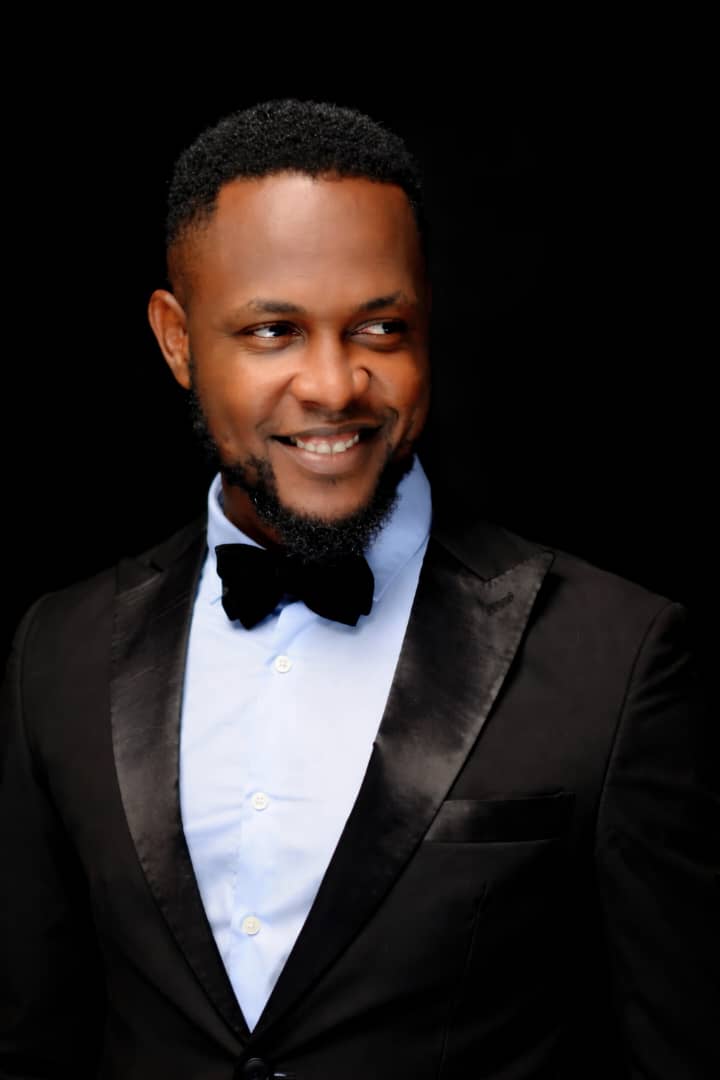
HOPE BEYOND THE WALLS 2026: ASSOCIATION OF MODELS SUCCESSFULLY SECURES RELEASE OF AN INMATE, CALLS FOR CONTINUED SUPPORT
The Association of Models (AOMNGO) proudly announces the successful completion of the first edition of Hope Beyond the Walls 2026, a humanitarian initiative dedicated to restoring hope and freedom to deserving inmates.
Despite enormous challenges, financial pressure, emotional strain, and operational stress, the organization remained committed to its mission. Through perseverance, faith, and collective support, one inmate has successfully regained freedom a powerful reminder that hope is stronger than circumstance.
This milestone did not come easily.
Behind the scenes were weeks of coordination, advocacy, fundraising, documentation, and intense engagement. There were moments of uncertainty, but the determination to give someone a second chance kept the vision alive.
Today, the Association of Models gives heartfelt appreciation to all partners and sponsors, both locally and internationally, who stood with us mentally, financially, morally, and physically.
Special Recognition and Appreciation To:
Correctional Service Zonal Headquarters Zone A Ikoyi
Esan Dele
Ololade Bakare
Ify
Kweme
Taiwo & Kehinde Solagbade
Segun
Mr David Olayiwola
Mr David Alabi
PPF Zion International
OlasGlam International
Razor
Mr Obinna
Mr Dele Bakare (VOB International)
Tawio Bakare
Kehinde Bakare
Hannah Bakare
Mrs Doyin Adeyemi
Shade Daniel
Mr Seyi United States
Toxan Global Enterprises Prison
Adeleke Otejo
Favour
Yetty Mama
Loko Tobi Jeannette
MOSES OLUWATOSIN OKIKIADE
Moses Okikiade
(Provenience Enterprise)
We also acknowledge the numerous businesses and private supporters whose names may not be individually mentioned but whose contributions were instrumental in achieving this success.
Your generosity made freedom possible.
A CALL TO ACTION
Hope Beyond the Walls is not a one-time event. It is a movement.
There are still many deserving inmates waiting for a second chance individuals who simply need financial assistance, legal support, and advocacy to reunite with their families and rebuild their lives.
The Association of Models is therefore calling on:
Corporate organizations
Local and international sponsors
Philanthropists
Faith-based organizations
Community leaders
Individuals with a heart for impact
to partner with us.
Our vision is clear:
To secure the release of inmates regularly monthly, quarterly, or during special intervention periods through structured support and transparent collaboration.
HOW TO SUPPORT
Interested partners and supporters can reach out via
Social Media: Official Handles Hope In Motion
Donations and sponsorship inquiries are welcome.
Together, we can turn difficult stories into testimonies of restoration.
ABOUT AOMNGO
The Association of Models (AOMNGO) is a humanitarian driven organization committed to advocacy, empowerment, and social impact. Through projects like Hope Beyond the Walls, the organization works tirelessly to restore dignity and create opportunities for individuals seeking a second chance.
“When we come together, walls fall and hope rises.”
For media interviews, partnerships, and sponsorship discussions, please contact the Association of Models directly.
society
SENATOR ADEOLA YAYI REGISTERS 4000 JAMB CANDIDATES
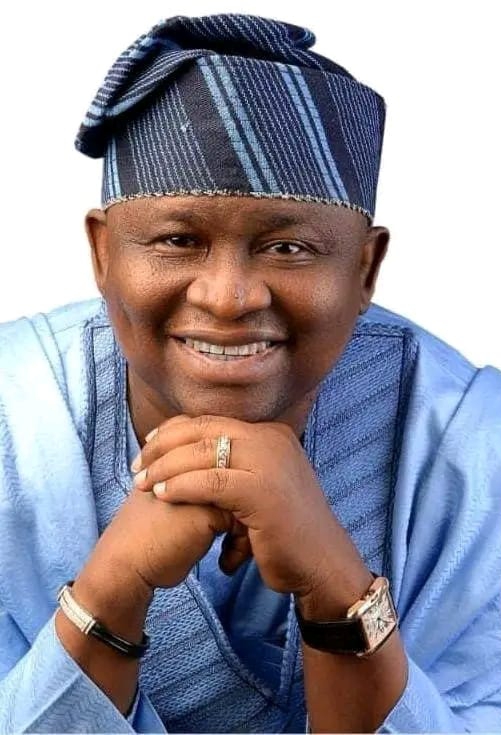
SENATOR ADEOLA YAYI REGISTERS 4000 JAMB CANDIDATES
In continuation of his educational support initiatives and following established tradition, Senator Solomon Adeola (APC,Ogun West) has successfully paid for and enrolled 4000 indigent students for the 2026 Joint Admission Matriculation Board(JAMB) examination.
According to a release e-signed and made available to members of the League of Yewa-Awori Media Practitioners (LOYAMP) by High Chief Kayode Odunaro, Media Adviser to Senator Adeola and shared with (your mediu), the programme financed by the senator under the “SEN YAYI FREE JAMB 2026” ended on Saturday , February 21, 2026, with a total of 4000 candidates successfully enrolled with their PINs provided.
Commenting on the success of the programme, Senator Adeola said the programme is another leg of his personal educational empowerment for indigent but brilliant citizens preparatory to his scholarship and bursary facilitation for tertiary education institutions’ students.
“As far as I can help it, none of our children will miss educational opportunities arising out of adverse economic predicament of their parents or guardians”, he stated.
Successful candidates cut across all the three senatorial districts of Ogun State with 2183 coming from Ogun West, 1358 coming from Ogun Central and 418 from Ogun East.
Some of the candidates that applied and are yet to get their PINs due wrong information supplied in their profiles and being underage as discovered by JAMB and other reasons are being further assisted to see the possibility of getting their PINs.
The Free JAMB programme of the Senator that has been running for years is well received by appreciative beneficiaries and their parents.
Alhaji Suara Adeyemi from Ipokia Local Government whose daughter successfully got her PIN in the programme said the Senator’s gesture was a welcome financial relief for his family at this period after payment of numerous school fees of other siblings of the beneficiary seeking admission to higher institution.
Also posting on the social media handle of the Senator, a beneficiary Mr. Henry Olaitan, from Odeda LGA said that he would have missed doing the entry examination as his guardian cannot afford the fees for himself and two of his children.
society
House Committee Seeks Stronger Financial Backing for Federal Character Commission
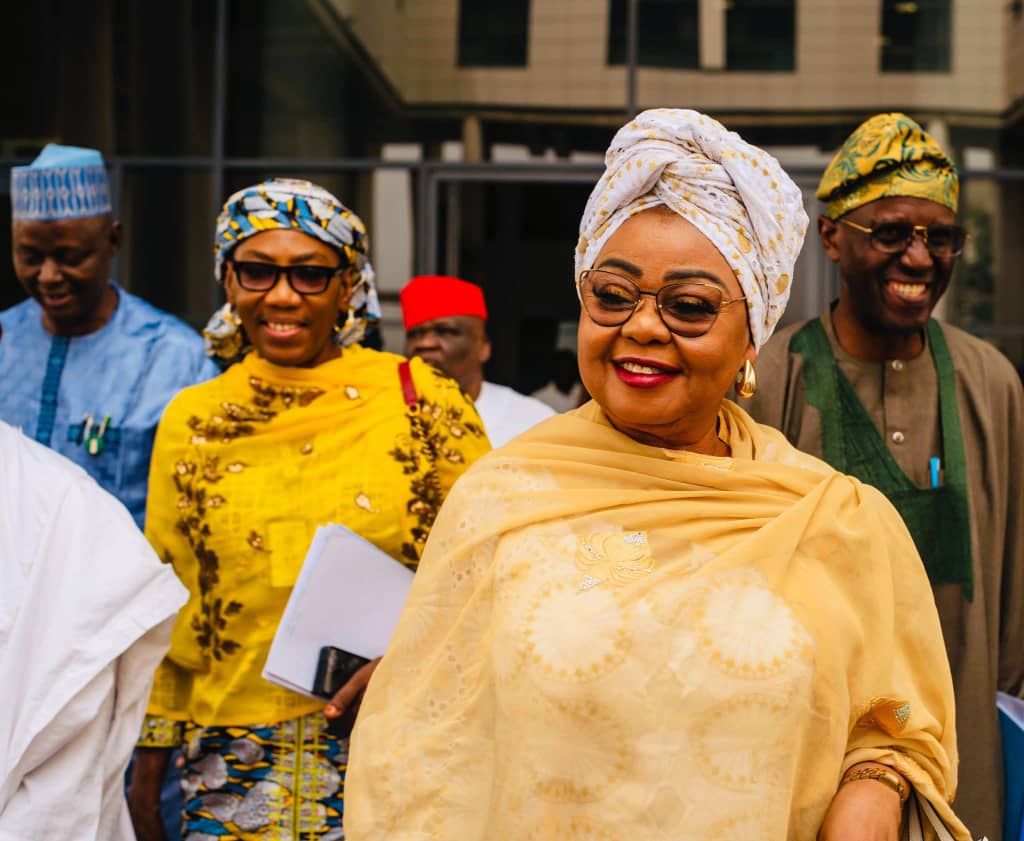
House Committee Seeks Stronger Financial Backing for Federal Character Commission
The Executive Chairman of the Federal Character Commission (FCC), Honorable Hulayat Motunrayo Omidiran, has reassured the commitment of her new leadership to reposition the Commission and strengthen enforcement of the federal character principle, despite prevailing funding challenges.
Hon. Omidiran made this known during the Commission’s budget defence before the House of Representatives Committee on Federal Character at the National Assembly on Friday, February 19, 2026.
The Executive Chairman opened up on inadequate funding has continued to constrain the Commission’s statutory activities, including nationwide monitoring, compliance audits and enforcement measures across Ministries, Departments and Agencies (MDAs).
“We are focused and determined to do the work that the Constitution and the President have entrusted us with,” Omidiran stated.
The FCC Boss, however, assured lawmakers that the Commission remains resolute in ensuring equity, fairness and balanced representation in line with its constitutional mandate.
“As a Commission, it is our responsibility to engage with relevant government parastatals and ministries to secure the necessary funding we require. We believe that with consultation and collaboration, it will be a successful venture for the Commission.”
Earlier, the Chairman of the House Committee on Federal Character, RT. Hon. Ahmed Idris Wase, expressed deep concern over what he described as near-zero budgetary allocation to the Commission, stressing that such financial inadequacies severely undermine its operational effectiveness.
The Plateau State lawmaker assured the Commission of the Committee’s firm legislative backing in advocating for improved funding and strengthening the Commission’s capacity to fully exercise its constitutional mandate.
“We cannot reasonably expect the Federal Character Commission to enforce compliance across Ministries, Departments, and Agencies while grappling with insufficient funding,” Hon. Wase remarked.
“If we are genuinely committed to fairness, equity, and national cohesion, then we must be deliberate in adequately funding the institution established to safeguard these principles.
“As a Committee, we shall work closely with the leadership of the Commission to ensure that its budgetary provisions reflect the magnitude of its mandate. The era of skeletal or token funding must give way to realistic and sustainable financial support,” he concluded.
The budget defence session concluded on a note of renewed collaboration between the House of Representatives and the Commission, reflecting a shared determination to strengthen institutional capacity, enhance accountability, and promote equitable representation within Nigeria’s public service.
SIGNED:
Ademola Lawrence
Spokesperson,
Federal Character Commission
February 20, 2026
-

 celebrity radar - gossips6 months ago
celebrity radar - gossips6 months agoWhy Babangida’s Hilltop Home Became Nigeria’s Political “Mecca”
-

 society6 months ago
society6 months agoPower is a Loan, Not a Possession: The Sacred Duty of Planting People
-

 society5 months ago
society5 months agoReligion: Africa’s Oldest Weapon of Enslavement and the Forgotten Truth
-

 news6 months ago
news6 months agoTHE APPOINTMENT OF WASIU AYINDE BY THE FEDERAL GOVERNMENT AS AN AMBASSADOR SOUNDS EMBARRASSING

